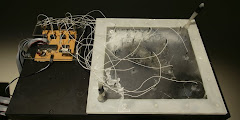by Tom Holert
Lately, the concept of “knowledge production” has drawn new attention and prompted strong criticism within art discourse. One reason for the current conflictual status of this concept is the way it can be linked to the ideologies and practices of neoliberal educational policies. In an open letter entitled “To the Knowledge Producers,” a student from the Academy of Fine Arts Vienna has eloquently criticized the way education and knowledge are being “commodified, industrialized, economized and being made subject to free trade.”1
In a similar fashion, critic Simon Sheikh has addressed the issue by stating that “the notion of knowledge production implies a certain placement of thinking, of ideas, within the present knowledge economy, i.e. the dematerialized production of current post-Fordist capitalism”; the repercussions of such a placement within art and art education can be described as an increase in “standardization,” “measurability,” and “the molding of artistic work into the formats of learning and research.”2 Objections of this kind become even more pertinent when one considers the suggestive rhetoric of the major European art educational network ELIA (European League of Institutes of the Arts), which, in a strategy paper published in May 2008, linked “artistic research” to the EU policy of the generation of “’New Knowledge’ in a Creative Europe.”
More.
Thanks to Michelle Gratacós Arill for this reference.
Research and Practice explores practice-based research in art, craft and design.
RECOMMENDED READING
- Allen, Stan. Practice: Architecture, Technique and Representation. Amsterdam: G+B Arts International, 2000.
- Balkema Anette and Slager, Henk: Artistic Research, Special volume of Lier & Boog Series of Philosophy of Art and Art Theory, vol. 18, Amsterdam 2004.
- Bibliography on supervision, research training, and research in art and design
- Biggs, M. (2004) "Learning from Experience: approaches to the experiential component of practice-based research" in: Forskning, Reflektion, Utveckling. Stockholm, Vetenskapsrådet, 6-21.
- Biggs, Michael. Foundations of practice-based research: proceedings of the research into practice conference
- Buchanan, R. “Declaration by Design: Rhetoric, Argument, and Demonstration in Design Practice” in Margolin, Victor ed. (1989) Design Discourse: History, Theory, Criticism (Chicago and London: University of Chicago Press).
- Buchanan, Richard. "Rhetoric, Humanism, and Design." In Discovering Design: Explorations in Design Studies, edited by Richard Buchanan and Victor Margolin, 23-68. Chicago: University of Chicago Press, 1995.
- Chenail, Ronald J. “But is it research?”
- Churchman C. W. (1971) The Design of Inquiring Systems: Basic Concepts of Systems and Organization. New York: Basic Books Inc.
- Cross, Nigel. "Design Research: A Disciplined Conversation." Design Issues 15, no. 2 (Summer 1999): 5-10.
- Cross, Nigel. "Discovering Design Ability." In Discovering Design, edited by Richard Buchanan and Victor Margolin, 105-120. Chicago: University of Chicago Press, 1995.
- Frayling, Christopher. "Research in Art and Design." Royal College of Art Research Papers 1, no. 1 (1993-4): 1-5.
- Hanulla, Mika, Suoranta, Juha & Vadén, Tere. Artistic Research – theories, methods and practices, Art Monitor, Gothenburg 2005. “Introduction”, p. 9-22 and “Artistic Research in Practice”, p. 109-118
- Hughes, Rolf. "Experience and Communication" in Reflections 7 (Brussels: Sint-Lucas School of Architecture, 2007)
- Hughes, Rolf. "The Art of Displacement: Designing Experiential Systems and Transverse Epistemologies as Conceptual Criticism." In Footprint Issue # 4, Spring 2009, Agency in Architecture: Reframing Criticality in Theory and Practice
- Klein, J. T. (2004) “Interdisciplinarity and complexity: An evolving relationship” E:CO Special Double Issue Vol. 6 Nos. 1-2.
- Kuhn, T. S. (1970) The Structure of Scientific Revolutions, 2nd. ed., Chicago: Univ. of Chicago Press.
- Leavy, P. (2009). Method meets art: Arts-based research practice. New York: Guilford Press.
- Mazé, Ramia, and Johan Redström. "Difficult Forms: Critical Practices in Design and Research." In Proceedings of the conference of the International Association of Societies of Design Research. Hong Kong: IASDR, 2007.
- Mazé, Ramia. Occupying Time: Design, Technology and the Form of Interaction. Stockholm: Axl Books, 2007.
- Mäkelä, Maarit and Routarinne, Sara, eds. The art of research : research practices in art and design. Helsinki, Finland: UIAH, 2006.
- Ryle, G. (1949) The Concept of Mind. Harmondsworth: Penguin Books.
- Schön, D. (1981) The Reflective Practitioner. New York: Jossey-Bass.
- Shales, Ezra: “Technophilic Craft”, American Craft Magazine, April/May 2008.
- Simons, H. W., ed. (1990) The Rhetorical Turn: Invention and Persuasion in the Conduct of Inquiry (Chicago and London: University of Chicago Press)
- Talkin' Loud and Sayin' Something (catalogue)
Dendritic computer

by Pablo Miranda and Arijana Kajfes
Vannevar Bush, As we May Think (1945)
The difficulty seems to be, not so much that we publish unduly in view of the extent and variety of present day interests, but rather that publication has been extended far beyond our present ability to make real use of the record. The summation of human experience is being expanded at a prodigious rate, and the means we use for threading through the consequent maze to the momentarily important item is the same as was used in the days of square-rigged ships.
But there are signs of a change as new and powerful instrumentalities come into use...
But there are signs of a change as new and powerful instrumentalities come into use...
Links
About Me
- Rolf Hughes
- Writer & critic; Guest Professor in Theory and Practice-Based Research at the Department of Interdisciplinary Studies at Konstfack University College of Arts, Crafts and Design, Stockholm; Senior Professor in Research Design at the Sint-Lucas School of Architecture, Brussels & Ghent; Senior Researcher at the Royal Institute of Technology, School of Architecture, Stockholm.